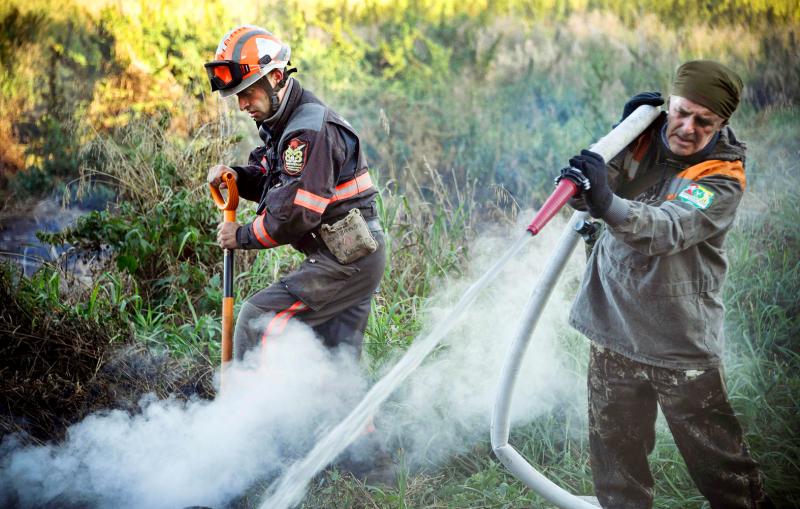Equipped with a shovel, Grigory Kuksin lifts and turns smoldering earth in the marshy clearing of a sprawling Siberian forest.
Together with a small cohort of volunteer firefighters, he is battling a winter-resistant, underground blaze, a growing problem in Russia that he calls a “climate bomb.”
“These are underground fires: zombie fires,” Greenpeace Russia Wildfire Unit head Grigory Kuksin, 40, said.

Photo: AFP
The vast bog topped with nettle and surrounded by a thick pine forest is part of the Suzunsky Nature Reserve, located a two-and-a-half-hour ride south of Russia’s third-largest city, Novosibirsk.
Its soft surface is peat — a fuel formed by the slow decomposition of organic matter in humid environments — which has been smoldering for about five years, Kuksin said.
Lying dormant 1m beneath the Earth’s surface, the fire has survived biting Siberian winters because of low groundwater levels — a result of regular droughts.
“But peat never catches fire on its own. Man is always responsible,” Kuksin said, adding that a poorly stubbed out cigarette is enough to start a fire that would take years to extinguish.
After winter — when summer temperatures soar — the fires can return from the dead, igniting dry grass on the surface and spreading over large areas.
“That’s what happened last summer,” said 60-year-old Sergei Akopov, one of the volunteer firefighters tackling the blaze, adding that he battled a wildfire that sparked from the bog last year.
“We saw the foxes and hares running from the flames,” said the trained lawyer, who has repeatedly wrestled with bog fires over the past few years.
Scientists have said that Siberia and the Arctic are especially vulnerable to climate change, and have recorded startlingly high temperatures and worsening forest blazes.
In June, the Arctic city of Verkhoyansk recorded unprecedented temperatures of 38°C and about 9 million hectares of forest — an area the size of Portugal — have been affected by fires this year, officials said.
Peatland fires are an additional threat to the climate because of the large quantities of carbon dioxide that they release into the atmosphere.
“It’s a climate bomb,” Kuksin said, adding that it is a vicious circle, where fires made worse by climate change release gases that in turn exacerbate climate change.
Nearby, volunteers drenched the ground with water pumped from a nearby marsh and sprayed it with two fire hoses.
Once the earth is turned over and saturated, the temperature of the underground layer of peat is measured. If the temperature is above 40°C, the process is repeated.
“It’s a dirty job”, said Alexander Sukhov, a 38-year-old farmer who last year created the volunteer group that was trained by Greenpeace.
The environmental group says its volunteers are left to carry out the difficult work without help from local emergency services, which it says lacks the skills and experience to put out peat fires.
“They pretended this fire didn’t exist for five years,” Kuksin said.
The professional and volunteer firefighters have left, Kuksin said, but he is sure that beneath the surface, “the bog continues to burn.”

BOMBARDMENT: Moscow sent more than 440 drones and 32 missiles, Volodymyr Zelenskiy said, in ‘one of the most terrifying strikes’ on the capital in recent months A nighttime Russian missile and drone bombardment of Ukraine killed at least 15 people and injured 116 while they slept in their homes, local officials said yesterday, with the main barrage centering on the capital, Kyiv. Kyiv City Military Administration head Tymur Tkachenko said 14 people were killed and 99 were injured as explosions echoed across the city for hours during the night. The bombardment demolished a nine-story residential building, destroying dozens of apartments. Emergency workers were at the scene to rescue people from under the rubble. Russia flung more than 440 drones and 32 missiles at Ukraine, Ukrainian President Volodymyr Zelenskiy

COMPETITION: The US and Russia make up about 90 percent of the world stockpile and are adding new versions, while China’s nuclear force is steadily rising, SIPRI said Most of the world’s nuclear-armed states continued to modernize their arsenals last year, setting the stage for a new nuclear arms race, the Stockholm International Peace Research Institute (SIPRI) said yesterday. Nuclear powers including the US and Russia — which account for about 90 percent of the world’s stockpile — had spent time last year “upgrading existing weapons and adding newer versions,” researchers said. Since the end of the Cold War, old warheads have generally been dismantled quicker than new ones have been deployed, resulting in a decrease in the overall number of warheads. However, SIPRI said that the trend was likely

‘SHORTSIGHTED’: Using aid as leverage is punitive, would not be regarded well among Pacific Island nations and would further open the door for China, an academic said New Zealand has suspended millions of dollars in budget funding to the Cook Islands, it said yesterday, as the relationship between the two constitutionally linked countries continues to deteriorate amid the island group’s deepening ties with China. A spokesperson for New Zealand Minister of Foreign Affairs Winston Peters said in a statement that New Zealand early this month decided to suspend payment of NZ$18.2 million (US$11 million) in core sector support funding for this year and next year as it “relies on a high trust bilateral relationship.” New Zealand and Australia have become increasingly cautious about China’s growing presence in the Pacific

Indonesia’s Mount Lewotobi Laki-Laki yesterday erupted again with giant ash and smoke plumes after forcing evacuations of villages and flight cancelations, including to and from the resort island of Bali. Several eruptions sent ash up to 5km into the sky on Tuesday evening to yesterday afternoon. An eruption on Tuesday afternoon sent thick, gray clouds 10km into the sky that expanded into a mushroom-shaped ash cloud visible as much as 150km kilometers away. The eruption alert was raised on Tuesday to the highest level and the danger zone where people are recommended to leave was expanded to 8km from the crater. Officers also